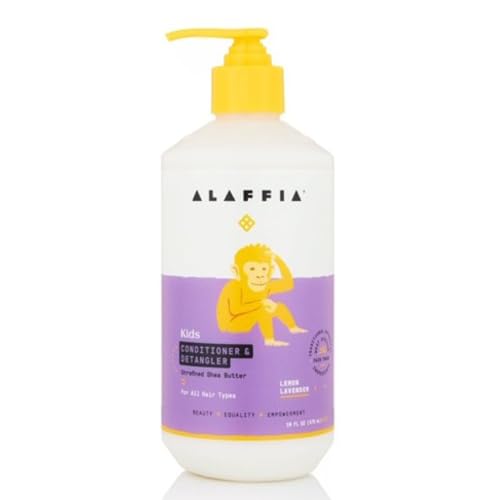
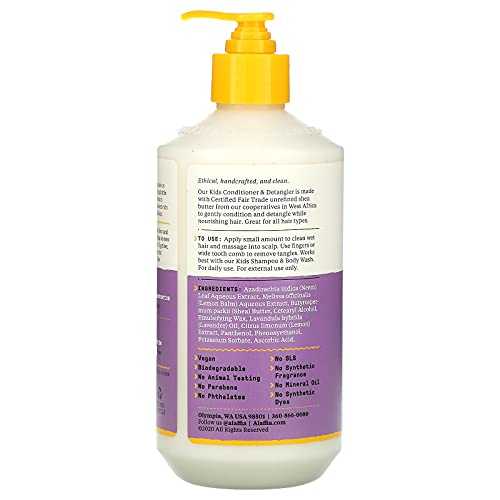
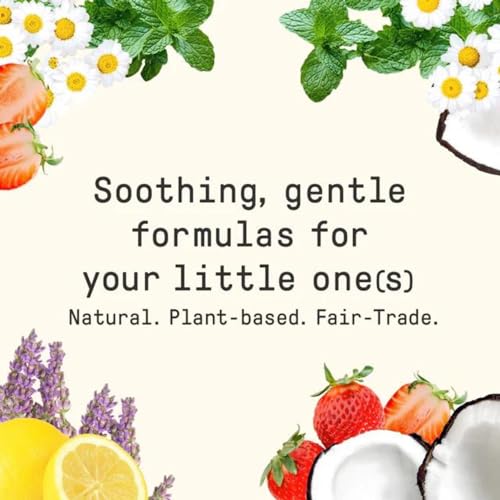
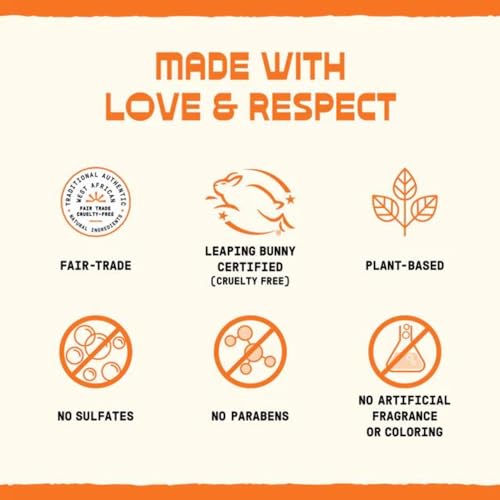
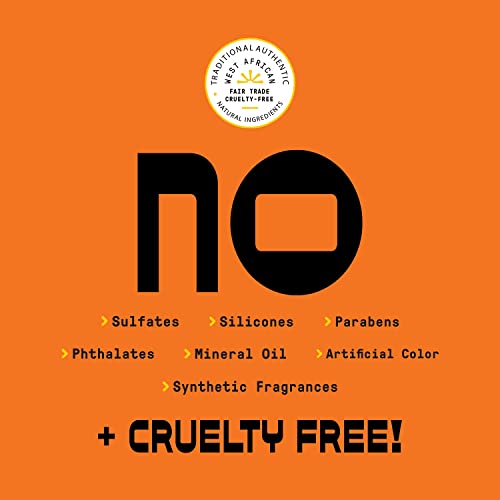

Alaffia Kids Conditioner - Nourishing Detangler with Lemon Lavender, Cruelty-Free - 16oz


Emulsifying Wax
Medium RiskEmulsifying wax is a mixture derived from plant and synthetic sources, primarily used to stabilize emulsions in cosmetic and personal care products. Its primary function is to blend oil and water-based ingredients, ensuring a uniform consistency and enhancing product texture.
Sustai Insights
Emulsifying wax offers functional benefits as an effective emulsifier, helping to create stable formulations in cosmetic products. It generally poses low health risks, with minimal concerns regarding carcinogenicity and allergenic potential. Environmental risks are also low, with no significant pollutant or bioaccumulation issues. However, use restrictions exist, and irritation potential is noted for sensitive skin. Regulatory assessments indicate it is safe for use within established concentration limits, leading to an overall moderate risk assessment. Alternatives like plant-based emulsifiers may offer sustainable options.
Melissa Officinalis (Balm Mint) Extract
Medium RiskMelissa officinalis extract is derived from the leaves of the lemon balm plant. It is commonly used in food and cosmetic products for its potential calming properties and as a flavoring agent. The extract is recognized for its aromatic qualities and is utilized in various formulations.
Sustai Insights
Melissa officinalis extract offers functional benefits such as flavor enhancement and potential calming effects. It is generally considered low risk for carcinogenicity and developmental toxicity, though moderate concerns regarding allergies exist. Environmental risks are minimal, with no significant pollutant or bioaccumulation issues reported. Regulatory bodies have placed no major restrictions on its use, marking it as moderate risk overall. Safe usage practices should be followed, and alternatives such as chamomile extract may be considered for similar benefits.
Phenoxyethanol
Medium RiskPhenoxyethanol is a preservative used in cosmetics and personal care products to prevent microbial growth and extend shelf life. It is commonly found in formulations such as lotions, creams, and serums.
Sustai Insights
Phenoxyethanol serves effectively as a preservative, ensuring product stability and safety by inhibiting microbial growth. It is considered to have low health risks regarding carcinogenicity, allergies, and reproductive toxicity. However, moderate use restrictions exist, and regulatory bodies have advised caution in specific applications. Environmental concerns include its potential as a pollutant, although it is not highly bioaccumulative. Overall, the ingredient presents a medium risk level, with safe usage practices recommended and alternative preservatives available for those seeking greener options.
Potassium Sorbate
Medium RiskPotassium sorbate is a potassium salt of sorbic acid, primarily used as a preservative in food and cosmetic products. It inhibits the growth of molds, yeast, and some bacteria, extending the shelf life of products. It is commonly found in various formulations due to its effectiveness and low toxicity.
Sustai Insights
Potassium sorbate serves as an effective preservative, preventing microbial growth in food and cosmetic products, which is vital for safety and longevity. Although it has a low risk of carcinogenicity and developmental toxicity, there is a moderate concern regarding allergies and immunotoxicity. Environmentally, it poses minimal risks as it is not significantly bioaccumulative. Regulatory agencies have verified its use, although some products may face restrictions. Overall, it is assessed as a medium risk ingredient, with safe usage practices recommended, and alternatives such as natural preservatives could be considered.
Lavandula Hybrida Oil
Low RiskLavandula hybrida oil is an essential oil obtained from the hybrid lavender plant, known for its aromatic properties and use in various cosmetic and therapeutic applications. It is commonly used for its fragrance and potential calming effects in personal care products.
Sustai Insights
Lavandula hybrida oil offers functional benefits as a fragrance and may have mild calming effects. It is sustainably sourced and typically presents low risks for carcinogenicity, allergies, and reproductive toxicity. However, it carries low to moderate concerns about endocrine disruption. Environmental impacts are minimal, and it is not currently subject to significant regulatory restrictions. Overall, the risk level associated with this ingredient is low, making it a relatively safe option in product formulations.
Azadirachtin Indica (Neem) Powder
Low RiskAzadirachtin indica (neem) powder is derived from the seeds of the neem tree, primarily used for its insecticidal properties. It functions as a natural pesticide and is often incorporated into agricultural products to manage pest populations without the use of synthetic chemicals.
Sustai Insights
Neem powder offers functional benefits as a natural pesticide, effectively controlling pests while being biodegradable and sustainably sourced. Health risks are low, with minimal concerns regarding carcinogenicity, allergies, or reproductive toxicity. Environmental risks are also low, as it does not significantly contribute to pollution or bioaccumulation. Regulatory bodies do not impose any specific restrictions on its use, affirming its safety profile. Overall, the ingredient poses a low risk, making it a viable option for eco-friendly pest management.
Citrus Limon (Lemon) Fruit Extract
Low RiskCitrus limon (lemon) fruit extract is derived from the fruit of the lemon tree, Citrus medica limonum. It is commonly used in cosmetic and personal care formulations for its fragrance and potential skin benefits.
Sustai Insights
Citrus limon extract offers functional benefits, including natural fragrance and potential antioxidant properties. It is generally considered safe, with low concerns regarding allergies, carcinogenicity, and reproductive toxicity. However, it may cause skin irritation in sensitive individuals. Environmentally, it poses low risks, as it is biodegradable and not bioaccumulative. Regulatory agencies do not impose significant restrictions on its use. Overall, the risk level for this ingredient is low, making it a favorable choice in formulations.
Ascorbic Acid (Vitamin C)
Low RiskAscorbic acid (Vitamin C) is a naturally occurring antioxidant essential for various biological functions, including collagen synthesis and immune response. It is commonly used in cosmetic and food products for its preservative properties and ability to enhance skin brightness.
Sustai Insights
Ascorbic acid provides functional benefits as an effective antioxidant and preservative, contributing to skin health and product stability. It is generally recognized as safe with low health risks, including minimal concerns for carcinogenicity and allergies. Environmentally, it poses low risks, as it is biodegradable and does not bioaccumulate. Regulatory bodies like the FDA have not imposed significant restrictions on its use. Overall, the ingredient presents a low risk, with safe usage practices ensuring consumer safety, and alternatives such as natural extracts exist for those seeking different formulations.
Panthenol
Low RiskPanthenol, a derivative of vitamin B5, is commonly used in cosmetic formulations for its moisturizing and skin-conditioning properties. It acts as a humectant, helping to retain moisture in the skin and hair, thereby improving hydration and texture.
Sustai Insights
Panthenol offers functional benefits such as effective hydration and skin conditioning, making it valuable in various cosmetic products. It is considered low risk regarding health impacts, with minimal concerns about carcinogenicity, allergies, or reproductive toxicity. Environmental risks are also low, with no significant pollutant or bioaccumulation potential. Regulatory bodies have not imposed restrictions on its use. Safe usage practices include adhering to recommended concentrations. Alternatives like glycerin may provide similar moisturizing benefits, but overall, panthenol is assessed as a low-risk ingredient.
Cetearyl Alcohol
Low RiskCetearyl alcohol is a mixture of cetyl and stearyl alcohol, primarily used as an emulsifier and thickener in cosmetic formulations. It helps stabilize products, improve texture, and enhance moisturizing properties, making it common in creams and lotions.
Sustai Insights
Cetearyl alcohol offers functional benefits as an effective emulsifier and skin-conditioning agent, contributing to product stability and texture. It is generally recognized as safe, with low concerns for carcinogenicity, allergies, or reproductive toxicity. Environmental risks are minimal, as it is biodegradable and has low pollutant potential. Regulatory bodies have not imposed significant restrictions on its use. Overall, cetearyl alcohol is assessed to carry low risk, making it a suitable ingredient choice in cosmetic products.
Butyrospermum Parkii (Shea) Butter
Low RiskButyrospermum parkii (shea) butter is a vegetable fat derived from the nuts of the shea tree. It is commonly used in cosmetic formulations for its emollient properties, providing moisture and improving skin texture. Additionally, shea butter is known for its ability to enhance the stability of products and deliver a creamy texture.
Sustai Insights
Shea butter offers functional benefits as an effective moisturizer, enhancing skin barrier function and texture. It is sustainably sourced and biodegradable, contributing to eco-friendliness. Health-wise, it is associated with low risks for carcinogenicity, allergies, and reproductive toxicity. Environmental impacts are minimal, with no significant pollutant potential identified. Regulatory assessments indicate no current restrictions. Overall, the ingredient presents a low risk, making it a favorable choice in cosmetic formulations.
Lavandula Hybrida Oil
Low RiskLavandula hybrida oil is an essential oil obtained from the hybrid lavender plant, known for its aromatic properties and use in various cosmetic and therapeutic applications. It is commonly used for its fragrance and potential calming effects in personal care products.
Sustai Insights
Lavandula hybrida oil offers functional benefits as a fragrance and may have mild calming effects. It is sustainably sourced and typically presents low risks for carcinogenicity, allergies, and reproductive toxicity. However, it carries low to moderate concerns about endocrine disruption. Environmental impacts are minimal, and it is not currently subject to significant regulatory restrictions. Overall, the risk level associated with this ingredient is low, making it a relatively safe option in product formulations.
Emulsifying Wax
Medium RiskEmulsifying wax is a mixture derived from plant and synthetic sources, primarily used to stabilize emulsions in cosmetic and personal care products. Its primary function is to blend oil and water-based ingredients, ensuring a uniform consistency and enhancing product texture.
Sustai Insights
Emulsifying wax offers functional benefits as an effective emulsifier, helping to create stable formulations in cosmetic products. It generally poses low health risks, with minimal concerns regarding carcinogenicity and allergenic potential. Environmental risks are also low, with no significant pollutant or bioaccumulation issues. However, use restrictions exist, and irritation potential is noted for sensitive skin. Regulatory assessments indicate it is safe for use within established concentration limits, leading to an overall moderate risk assessment. Alternatives like plant-based emulsifiers may offer sustainable options.
Azadirachtin Indica (Neem) Powder
Low RiskAzadirachtin indica (neem) powder is derived from the seeds of the neem tree, primarily used for its insecticidal properties. It functions as a natural pesticide and is often incorporated into agricultural products to manage pest populations without the use of synthetic chemicals.
Sustai Insights
Neem powder offers functional benefits as a natural pesticide, effectively controlling pests while being biodegradable and sustainably sourced. Health risks are low, with minimal concerns regarding carcinogenicity, allergies, or reproductive toxicity. Environmental risks are also low, as it does not significantly contribute to pollution or bioaccumulation. Regulatory bodies do not impose any specific restrictions on its use, affirming its safety profile. Overall, the ingredient poses a low risk, making it a viable option for eco-friendly pest management.
Citrus Limon (Lemon) Fruit Extract
Low RiskCitrus limon (lemon) fruit extract is derived from the fruit of the lemon tree, Citrus medica limonum. It is commonly used in cosmetic and personal care formulations for its fragrance and potential skin benefits.
Sustai Insights
Citrus limon extract offers functional benefits, including natural fragrance and potential antioxidant properties. It is generally considered safe, with low concerns regarding allergies, carcinogenicity, and reproductive toxicity. However, it may cause skin irritation in sensitive individuals. Environmentally, it poses low risks, as it is biodegradable and not bioaccumulative. Regulatory agencies do not impose significant restrictions on its use. Overall, the risk level for this ingredient is low, making it a favorable choice in formulations.
Ascorbic Acid (Vitamin C)
Low RiskAscorbic acid (Vitamin C) is a naturally occurring antioxidant essential for various biological functions, including collagen synthesis and immune response. It is commonly used in cosmetic and food products for its preservative properties and ability to enhance skin brightness.
Sustai Insights
Ascorbic acid provides functional benefits as an effective antioxidant and preservative, contributing to skin health and product stability. It is generally recognized as safe with low health risks, including minimal concerns for carcinogenicity and allergies. Environmentally, it poses low risks, as it is biodegradable and does not bioaccumulate. Regulatory bodies like the FDA have not imposed significant restrictions on its use. Overall, the ingredient presents a low risk, with safe usage practices ensuring consumer safety, and alternatives such as natural extracts exist for those seeking different formulations.
Melissa Officinalis (Balm Mint) Extract
Medium RiskMelissa officinalis extract is derived from the leaves of the lemon balm plant. It is commonly used in food and cosmetic products for its potential calming properties and as a flavoring agent. The extract is recognized for its aromatic qualities and is utilized in various formulations.
Sustai Insights
Melissa officinalis extract offers functional benefits such as flavor enhancement and potential calming effects. It is generally considered low risk for carcinogenicity and developmental toxicity, though moderate concerns regarding allergies exist. Environmental risks are minimal, with no significant pollutant or bioaccumulation issues reported. Regulatory bodies have placed no major restrictions on its use, marking it as moderate risk overall. Safe usage practices should be followed, and alternatives such as chamomile extract may be considered for similar benefits.
Panthenol
Low RiskPanthenol, a derivative of vitamin B5, is commonly used in cosmetic formulations for its moisturizing and skin-conditioning properties. It acts as a humectant, helping to retain moisture in the skin and hair, thereby improving hydration and texture.
Sustai Insights
Panthenol offers functional benefits such as effective hydration and skin conditioning, making it valuable in various cosmetic products. It is considered low risk regarding health impacts, with minimal concerns about carcinogenicity, allergies, or reproductive toxicity. Environmental risks are also low, with no significant pollutant or bioaccumulation potential. Regulatory bodies have not imposed restrictions on its use. Safe usage practices include adhering to recommended concentrations. Alternatives like glycerin may provide similar moisturizing benefits, but overall, panthenol is assessed as a low-risk ingredient.
Phenoxyethanol
Medium RiskPhenoxyethanol is a preservative used in cosmetics and personal care products to prevent microbial growth and extend shelf life. It is commonly found in formulations such as lotions, creams, and serums.
Sustai Insights
Phenoxyethanol serves effectively as a preservative, ensuring product stability and safety by inhibiting microbial growth. It is considered to have low health risks regarding carcinogenicity, allergies, and reproductive toxicity. However, moderate use restrictions exist, and regulatory bodies have advised caution in specific applications. Environmental concerns include its potential as a pollutant, although it is not highly bioaccumulative. Overall, the ingredient presents a medium risk level, with safe usage practices recommended and alternative preservatives available for those seeking greener options.
Cetearyl Alcohol
Low RiskCetearyl alcohol is a mixture of cetyl and stearyl alcohol, primarily used as an emulsifier and thickener in cosmetic formulations. It helps stabilize products, improve texture, and enhance moisturizing properties, making it common in creams and lotions.
Sustai Insights
Cetearyl alcohol offers functional benefits as an effective emulsifier and skin-conditioning agent, contributing to product stability and texture. It is generally recognized as safe, with low concerns for carcinogenicity, allergies, or reproductive toxicity. Environmental risks are minimal, as it is biodegradable and has low pollutant potential. Regulatory bodies have not imposed significant restrictions on its use. Overall, cetearyl alcohol is assessed to carry low risk, making it a suitable ingredient choice in cosmetic products.
Potassium Sorbate
Medium RiskPotassium sorbate is a potassium salt of sorbic acid, primarily used as a preservative in food and cosmetic products. It inhibits the growth of molds, yeast, and some bacteria, extending the shelf life of products. It is commonly found in various formulations due to its effectiveness and low toxicity.
Sustai Insights
Potassium sorbate serves as an effective preservative, preventing microbial growth in food and cosmetic products, which is vital for safety and longevity. Although it has a low risk of carcinogenicity and developmental toxicity, there is a moderate concern regarding allergies and immunotoxicity. Environmentally, it poses minimal risks as it is not significantly bioaccumulative. Regulatory agencies have verified its use, although some products may face restrictions. Overall, it is assessed as a medium risk ingredient, with safe usage practices recommended, and alternatives such as natural preservatives could be considered.
Butyrospermum Parkii (Shea) Butter
Low RiskButyrospermum parkii (shea) butter is a vegetable fat derived from the nuts of the shea tree. It is commonly used in cosmetic formulations for its emollient properties, providing moisture and improving skin texture. Additionally, shea butter is known for its ability to enhance the stability of products and deliver a creamy texture.
Sustai Insights
Shea butter offers functional benefits as an effective moisturizer, enhancing skin barrier function and texture. It is sustainably sourced and biodegradable, contributing to eco-friendliness. Health-wise, it is associated with low risks for carcinogenicity, allergies, and reproductive toxicity. Environmental impacts are minimal, with no significant pollutant potential identified. Regulatory assessments indicate no current restrictions. Overall, the ingredient presents a low risk, making it a favorable choice in cosmetic formulations.
Experience the magic of Alaffia Kids Conditioner and Detangler in Lemon Lavender, designed to gently condition and detangle your child's hair while nourishing it. Perfect for all hair types and free from harmful chemicals, this vegan formula supports healthy hair care routines while promoting sustainability.
- Gentle Conditioning: Enriched with ethically sourced unrefined shea butter and lemon balm, this conditioner softens and detangles hair, making it easy to manage.
- Vegan & Cruelty-Free: Committed to ethical practices, Alaffia ensures that all products are cruelty-free and contain no parabens, sulfates, or synthetic fragrances.
- Socially Responsible: Choosing Alaffia supports women-led cooperatives in West Africa, contributing to education and environmental sustainability initiatives.
- Everyday Use: Ideal for normal to very dry hair types, this conditioner can be used daily to maintain healthy, shiny locks.
- Easy Application: Simply apply to wet hair, massage, detangle, and rinse for effortless hair care that leaves hair looking beautiful and nourished.
Subscribe & Save with Sustai
- Best Price Guarantee: Always enjoy the lowest prices on sustainable home essentials.
- No Surprises: We’ll notify you before shipping. No hidden fees, ever.
- You’re in Charge: Change, pause, or cancel your subscription anytime with ease.
- Eco-Friendly Deliveries: Our grouped shipments mean less packaging and lower emissions.
Join us on a sustainable journey. Special offers for a limited time! Prices and promotions may change.
Recommended Products
Experience the magic of Alaffia Kids Conditioner and Detangler in Lemon Lavender, designed to gently condition and detangle your child's hair while nourishing it. Perfect for all hair types and free from harmful chemicals, this vegan formula supports healthy hair care routines while promoting sustainability.
- Gentle Conditioning: Enriched with ethically sourced unrefined shea butter and lemon balm, this conditioner softens and detangles hair, making it easy to manage.
- Vegan & Cruelty-Free: Committed to ethical practices, Alaffia ensures that all products are cruelty-free and contain no parabens, sulfates, or synthetic fragrances.
- Socially Responsible: Choosing Alaffia supports women-led cooperatives in West Africa, contributing to education and environmental sustainability initiatives.
- Everyday Use: Ideal for normal to very dry hair types, this conditioner can be used daily to maintain healthy, shiny locks.
- Easy Application: Simply apply to wet hair, massage, detangle, and rinse for effortless hair care that leaves hair looking beautiful and nourished.

You can have at most 2 Sustainable Steals products in your cart
Customer Reviews
Customers’ View
Customers generally appreciate the effectiveness and gentle nature of the Kids Conditioner and Detangler, highlighting its pleasant lemon lavender scent and the softness it imparts to hair. Many parents mention that it leaves their children's hair smooth and manageable, with remarks like "it makes brushing easy" and "it leaves my daughter's hair so silky." The ethically sourced ingredients, such as unrefined shea butter and lemon balm, resonate well with health-conscious consumers. However, there are concerns regarding the product's functionality, as some users report mixed results on tangles and moisture levels, describing the conditioner as sometimes too watery. Additionally, issues with bottle quality, including fragile pumps and damages upon delivery, have been noted. Overall, while the product has many strengths, potential buyers should consider both its benefits and areas for improvement.
AI-generated from the text of customer reviewsThis product has no reviews yet.




